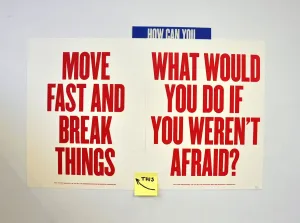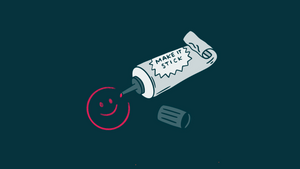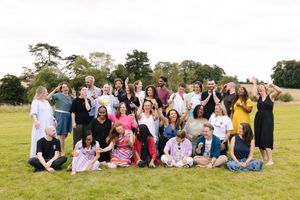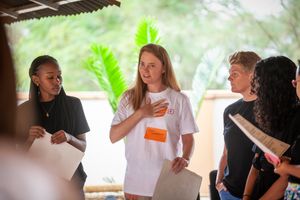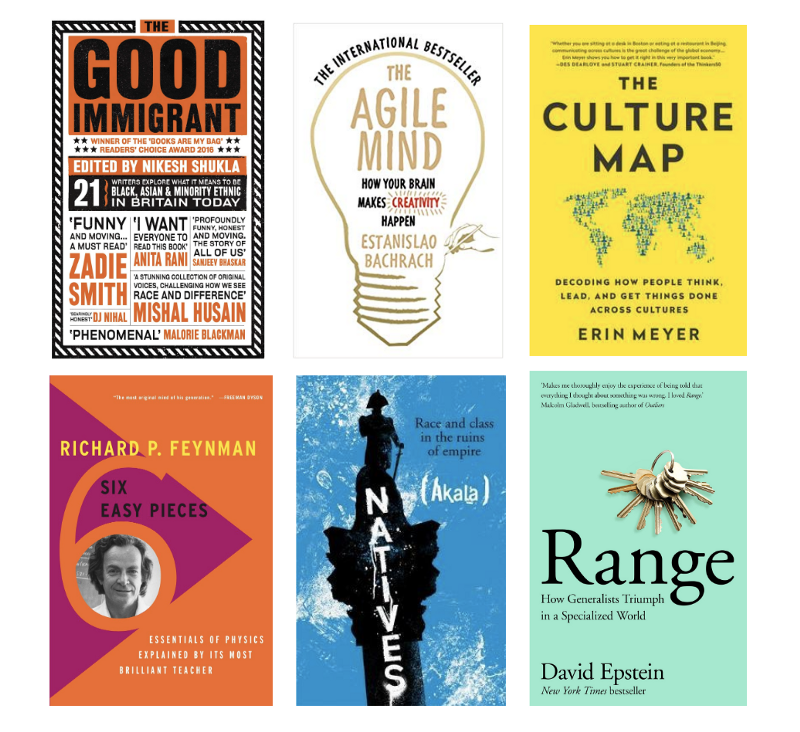
Global warming, global uprisings, impeachment, Brexit. In these times of strong opinions, strongly held, we wanted to take a moment to reflect on all the times we’ve changed our minds and shifted our ways of thinking and working at Brink.
That’s why we’ve put together a list of the content Brinksters have consumed this year that’s affected the way we think and influenced our practice.
These are just some of the books, podcasts and media that have helped us this year. Not all are new releases, in fact some go back 30 years or more but remain highly relevant today. We’ve clustered them into the topics of conversation we have at Brink studio and with our clients and partners, around the 3 facets of behavioural innovation: the mindsets, methods and mechanisms that enable it.
Tuck in, and let us know what you enjoyed and what changed your mind this year, too.
- Your brain on innovation
- Teaming
- Innovation method
- Science and tech
- Diversity and race
- Economics and policy as enablers of innovation
📚This year Brinksters have mostly been reading, watching, and listening to…
1. Your brain on innovation
The Mind is Flat: The Illusion of Mental Depth and The Improvised Mind, by Nick Chater
We all like to think we have a hidden inner life, murky depths of our minds that generate our beliefs and desires, depths we can plumb for the truth. If only we could work out how to access this mysterious world, we could truly understand ourselves. For more than a century, psychologists and psychiatrists have struggled to discover what lies below our mental surface.
In The Mind Is Flat, Nick Chater reveals that this entire approach is completely misguided. Drawing on the latest neuroscience and behavioural psychology research, he shows that really all we have is this moment. Our minds are flat.
#neuroscience #behinno
The Agile Mind: How your brain makes creativity happen, by Estanislao Bachrach
In our complex world, logic is insufficient. We need to amplify our empathy and creativity. Bachrach uses beautiful metaphors and practical tips to explain how to prepare the brain for these. To move from the brain’s energy-saving ‘reproductive thinking’, relax, do something fun or interesting and let the connections, ‘conceptual blending’ and insights flow. And when insights strike, use the surge of energy that comes with a gamma burst to turn them to action!

“As the stars are invisible during the day thanks to the light of the sun, many of our ideas are undiscovered because they are masked by our busy brains. Like the darkness of light reveals the stars, we need to calm our mind so we can see the solutions that are there.”
#ideas #calm
Your Brain at Work podcast by The Neuroleadership Institute
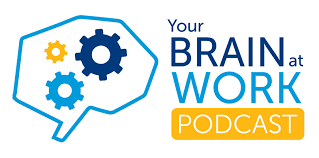
Bite-sized 20 minute portions of brain science applied to work. Hear from leaders (Patagonia on developing a ‘regenerative’ culture, Arianna Huffington on creating more human organisations) talking with scientists from The Neuroleadership Institute who explain why these things are important and what difference they make.
#neuroleadership #behinno
The Thriving Child: The science between reducing stress and nurturing independence by Dr William Stixrud and Ned Johnson
With this book I (Emma) discovered again that there’s so much overlap in books/thinking about children and teams. The Thriving Child is about how to nurture independent thinking and collaboration, which help children be happier and stress-free. What team wouldn’t benefit from the same? The brain science applies to all of us — we all need ‘radical down time’ to give our default mode time to organise our thoughts, clear the backlog, reflect on ourselves and others. It’s only when we are not on task, when our mind is wandering that our brain can make new connections and solve ‘unsolvable’ problems.
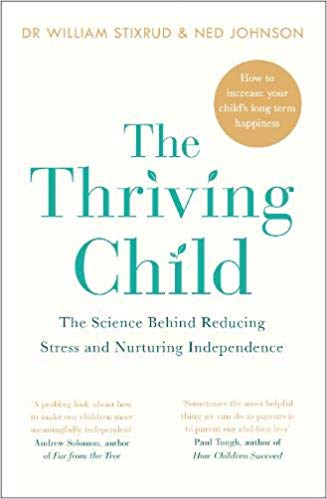
Overloaded Circuits: Why Smart People Underperform, by Edward Hallowell
A real oldie from a 2005 edition of Harvard Business Review, I (Abi) came across this when researching for some teaming work. Halloweel explains how, for so long, companies have mistakenly leveled criticism at overburdened employees and shown asking for help to be a weakness. But the evidence shows that when we give people permission to ask for help and are vigilant for signs of stress, organisations will go a long way toward fostering more productive, well-balanced, and intelligent work environments, better for workers and better for business. Still so relevant today.

#stress #humancircuitry
2. Teaming
The Brigade, Jason Atherton, TV series on BBC Two
A series ostensibly about cookery, which very quickly becomes apparent it’s really about the psychological highs and lows involved in forging a tight-knit crew under pressure. Michelin-starred chef Jason Atherton takes a team of raw cooking talent and, in six weeks, tries to turn them into a Chefs’ Brigade to compete with Europe’s finest restaurants. But the show is really an insight into how to build high-performing, diverse teams in a short time and under intense pressure.

#highpo #teaming
Let my people go surfing — Yvan Chouinard

An employee manual turned business book by the self-professed reluctant businessman and founder of Patagonia. A really interesting tale of how businesses and ideas grow and change with time, and the stark choices that business leaders will face to take a sustainable path, including the prioritisation of resources over customers, with customers needing to adapt and change. Oh, and it’s got some insanely cool photographs.

“Who are businesses really responsible to? Their customers? Shareholders? Employees? We would argue that it’s none of the above. Fundamentally, businesses are responsible to their resource base. Without a healthy environment there are no shareholders, no employees, no customers and no business.” — Yvon Chouinard
#futureofwork #sustainable
The Culture Map: decoding how people think, lead and get things done across cultures, by Erin Meyer

At Brink we work with the soft stuff, because it’s the hard stuff. And cultural differences bring another layer of complexity to the hard and messy human interactions. There is no recipe for success when it comes to cross-cultural communication, but Erin Meyer managed to develop a brilliant (and evidence-based) analytical framework to help us navigate cultural differences with some practical advice and supporting strategies. When beautifully mapped around 7 dimensions, culture becomes easier to decode and the ways in which people (mis)manage relations become clearer.
“What’s new is the requirement for 21st century leaders to be prepared to understand a wider, richer array of work styles than ever before and to be able to determine what aspects of an interaction are simply a result of personality and which are a result of differences in cultural perspective”

#Cross-cultural comms, #work

How’s work? (podcast) by Esther Perel
Esther Perel brilliantly brings her couple therapy experience into the workplace, inviting co-workers and co-funders to one-time therapy sessions to address “the invisible forces that shape workplace relationships”. This is based on the premise that when we come to work each morning, we bring with us all our relational patterns that we have developed throughout our lives. Esther remains candid and inquisitive in her approach, asking hard questions to surface and solve complex issues including: toxic work culture, intergenerational workplace dynamics, gender roles, co-funders break-up.
“I often say that the quality of our relationships determines the quality of our lives. Personal connections give us a deeper sense of happiness, belonging, meaning, and well-being than any other experience. This applies to our professional lives as well. “

#workrelationships
Range, How Generalists Triumph in a Specialized World, by David Epstein
We have long been taught that to succeed in any field we must specialise early on and spend many hours of deliberate practice. And, worse, that if you dabble or delay, you’ll never catch up with those who got a head start.
David Epstein shows us how this is completely wrong. Instead, the way to succeed is by sampling widely, gaining a breadth of experiences, taking detours, experimenting relentlessly, juggling many interests — in other words, by developing range.
He takes us through studies of athletes, artists, musicians, inventors and scientists, to show why in most fields — especially those that are complex and unpredictable like innovation — generalists, not specialists are primed to excel. I (Abi) learned loads about teams and how to assess people’s backgrounds, turns out I’ve been doing it all wrong. His words bust some of my assumptions about where expertise comes from in particular.
#innovation #generalist
3. Innovation Method
Product Leadership, by Scott Colfer
Scott was the Head of Product in the MoJ Digital while I (Alice) was there. This blog post sets out to explain what it means to be a leader in the Product profession in government digital, but has lots of useful overviews of leadership styles more broadly.
“Modern leaders need the ability to do the right thing in the midst of complexity. They need to avoid hierarchical leadership and ‘meme leadership’.”
He also summarises some of the most commonly used buzzwords in government, like digital transformation.
“‘Digital transformation’ seems to mean a mission and a method. The mission is probably improving the relationship between users and an organisation. The method is probably improvement of people, processes, tools, and mindset. Technology is one component of digital transformation.”
#product #leadership
Understanding Fake Agile — Forbes
“Experience suggests that the main fruits of Agile are only generated if the entire firm is operating from the same script.”
Especially as so many organisation & government leaders are aware of the benefits of Agile, it is sometimes imposed on teams and the teams are judged against how well they are “using Agile”. In this article Steve Denning argues that large firms aren’t “able to implement all the elements of Agile on Day One.”
“Agile is a journey… The journey never ends: firms go on finding new ways to become ever more agile.”
He also talks about the dangers of following the Agile ceremonies without having the right mindset or mechanisms to support that which is something I (Alice) have seen all too many times in government, and the results are therefore disappointing. He summarises it best:
“Without an Agile mindset, Agile remains an inert, lifeless set of ceremonies.”

#agile #mindset
One Big Thing, Nick Maggiuli
Did you know the biggest predictor of a horse’s racing ability is… the size of its heart?
When working in complicated systems that fuse social inequality with technology, it’s easy to get bogged down in the variables, levers, interconnections and elements that underlie a problem. What I (Asad) loved about this 6-minute read was how it encourages us to find, in everything, the one big thing.
https://ofdollarsanddata.com/one-big-thing/
#simplicity #systems-thinking
Invisibilia — The problem with the solution
This podcast comes and goes for me (James), but this episode really influenced my thinking. It talks to the fundamental benefits of falling in love with a problem. In this case, the episode follows a couple from Utah who became obsessed with fixing the drainer in their shower, and came up with a solution for it.
Then, as with all good narrative arcs in podcasts, the story switches to talking about the same approach with mental illness, and the issues associated with saying that someone has a “problem”. My learning for work? Start where you are, with anyone. Do not think it to be “wrong”. See the opportunity more than the issue.
https://castbox.fm/vb/21633305
#StartByStarting
4. Science and Tech
Kranzberg’s Six Laws of Technology
Three decades ago, a historian wrote six laws to explain society’s unease with the power and pervasiveness of technology. His work was based on historical examples taken from the Cold War, but even today the laws apply to everything tech from Bitcoin to Cambridge Analytica. A short and perfectly formed must-read that’s shaped my (Abi) practice as we explore the future of technology with governments around the world.

#Don’tBeEvil
Automating poverty — how algorithms punish the poor
Very important read that is always relevant in the work we do within international development. Tech can be viewed as the shiny silver bullet, and a sure path to efficiency in public services. But they can (particularly when AI is considered) exacerbate existing issues and biases, and flaws in technology. The main use cases talked about include “robodebt”, but the concept stretches far wider.

#robodebt
Six Easy Pieces, by Richard Feynman
The famous physicist Richard Feynman presents the six basic building blocks of physics, from atoms to gravity to energy to quantum behaviour.

I (Asad) loved the way Feynman takes something inaccessible and makes it simple — a reminder to us all; takes something we might remember from school as boring and makes it beautiful.
All technologies start from scientific breakthrough, and all scientific breakthrough builds from certain first principles, so it was refreshing to go back to the beginning in this way.
Conversely, experimentation — which is at the heart of innovation — derives from the scientific method. A section of the book that brings out how Feynman talks about experimentation was one of my favourites, and epitomises how clear and crisp his style is.
The principle of science, the definition, almost, is the following: The test of all knowledge is experiment. Experiment is the sole judge of scientific “truth.” But what is the source of knowledge? Where do the laws that are to be tested come from? Experiment, itself, helps to produce these laws, in the sense that it gives us hints. But also needed is imagination to create from these hints the great generalizations — to guess at the wonderful, simple, but very strange patterns beneath them all, and then to experiment to check again whether we have made the right guess.
#experimentation #imagination
Bad Blood: Secrets and Lies from a Silicon Valley Startup, John Carreyrou
The journalist John Carreyrou catalogues the rise and fall of Theranos, the multi-billion dollar healthtech biotech startup that was based on a false claims about the technology.
The book combines page-turning drama with sharp insight into how the Silicon Valley ecosystem breeds bubbles disconnected from reality. When medical professionals queried the claims of a blood sample being able to give so much detailed health information, they were dismissed by Theranos, it’s investors, and fans as the incumbent industry stopping disruption. A valuable lesson on the limits of a culture of technological disruption.
And apparently, it’s being made into a film with Jennifer Lawrence as Elizabeth Holmes!
#crooked #hype
What if cats disappeared from the world, by Genki Kawamura
A wonderfully crafted novella about a man who is told he will die tomorrow, but can put off his death by one day for every item he makes disappear from the world.
It was the first work of fiction I (Asad) read for a while, and it reminded me why I fell in love with reading. It takes a simple premise, and uses it to gently explore ideas from “how much is life really worth?” to “what legacy do we want to leave in the world?” to “how should we decide how to spend our hours?”. It’s one that’s been doing the rounds in my late-20’s London-based friendship circles, and the ending is sure to bring a tear to your eye.
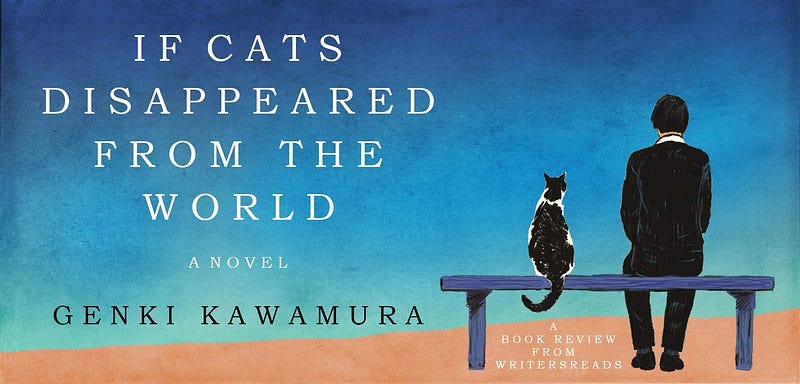
#miaow
5. Diversity and Race
Many books and discussions about race are US focused. These books really helped illuminate reality in the British context, which the team found really thought (and action) provoking.
Natives, by Akala
I (David) listened to this as an audiobook, which I would really recommend over the print form. Akala synthesises his comprehensive knowledge of historic racism of British society with his lived experience as a black man from Camden. He makes the important link between race and class in the UK, and points out our squeamishness and denial when it comes to confronting those matters, and that we shouldn’t be patting ourselves on the back for progress we’ve made in terms of equality. We still have a long way to go.
#race #class
Why I’m No Longer Talking to White People About Race, by Reni Eddo-Lodge
This pulls in British history, and illustrates really clearly that it’s not just people that are racist but so many of our systems. Racism is structural — “not just about personal prejudice, but the collective effects of bias”. I found the bits about ‘intersectionality’ really interesting — we often think about feminism and class separately from race, and rarely look at the unique experiences of people of colour.
#intersectionality
The Good Immigrant, by Nikesh Shukla

The Good Immigrant is a collection of short essays and stories about life in the UK by people of colour. Dip in, laugh, wince and enjoy a vivid slice of real life.
#goodimmigrant #badimmigrant
6. Economics and Policy as enablers of innovation
Utopia for Realists, by Rutger Bregman
What is the power of an idea? From basic income to a 15-hour workweek, Bregman explores some of the most radical ideas in public policy which today come under the umbrella vision of Utopia. The book also shows how vested interests and the dampening of ambition can be some of the biggest challenges to the adoption of innovative ideas.
#idealism #enablinginnovation
The Growth Delusion, David Pilling
In politics today, the all-powerful figure of GDP still reigns supreme. Governments assess their progress and make policy decisions often based on the impact they will have on economic growth. Pilling argues, as many others have, that economic growth does not account for the range of experiences that society has. GDP can therefore considered the “vanity metric” par excellence. Importantly however, Pilling adds that not all economic growth is the same. This means that, across society, short-termism is being favoured over delayed but sustainable prosperity.
#impact #economics
Prisoners of Geography: Ten Maps That Tell you Everything you Need to Know about Global Politics, by Tim Marshall
Tim Marshall provides the background story often overlooked in our political narrative — how a country’s geography impacts its strengths, vulnerabilities and ultimately its history and pathways to development. I (Alex) found the chapters on Africa and Latin America particularly fascinating, covering the problematic colonial past, with borders drawn without any consideration of context and culture, forever impacting people’s lives.
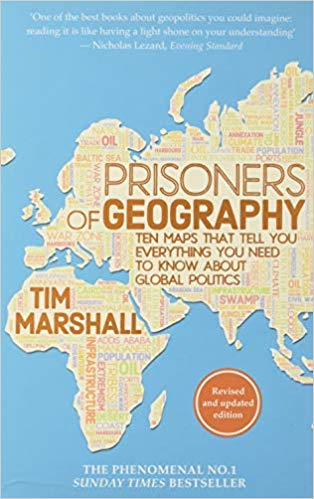
“All leaders are constrained by geography. Their choices are limited by mountains, rivers, seas and concrete. Yes, to follow world events you need to understand people, ideas and movements — but if you don’t know geography, you’ll never have the full picture”
He also addresses the falsity of nation state where artificial borders have divided tribes and families. It’s a great lecture that equips you with sharp insights into the deep-rooted factors that dictated history and that will influence the future development of nations, particularly useful when working in a new country, and in our work in international development.
“Africa’s coastline? Great beaches, but terrible natural harbours. Rivers? Amazing rivers, but most of them are rubbish for transporting anything, given that every few miles you go over a waterfall. These are just two in a long list of problems which help explain why Africa isn’t technologically or politically as successful as Western Europe or North America”

#maps #geopolitics
The Entrepreneurial State by Marianna Mazzucato
Mazzucato reframes the role of government from one that acts to limit the negative effects of market failure, to one of market shaping and creating. Drawing on a number of examples of where it’s already happened, she argues that by harnessing the power of an entrepreneurial state we can find answers to some of the biggest societal challenges.
I (Alice) particularly related to the way she described the negative perceptions of government, the way this self-perpetuates the lack of government internal capability and resulting inability to innovate. Moving to a narrative which allows civil servants to be galvanised around ambitious missions, rather than always being on the back foot, would ultimately catalyse innovation in society.
“To change the way we talk about the State is not just about changing rhetoric — it is about changing the way we reason about the State, its role and its structure.”

#neweconomics
We love to read and learn at Brink. Each new joiner gets a curated reading list, and a Kindle with unlimited access to books in our shared library. And it’s something we do with our clients, most recently curating a bookshelf for the innovation unit of a UK Government Department. If you’ve enjoyed this list and found it useful, would you like us to curate a bookshelf or reading list for your team? Drop us a line at [email protected] and let’s talk.
And what did we miss, what should we be adding to our reading lists for 2020?

